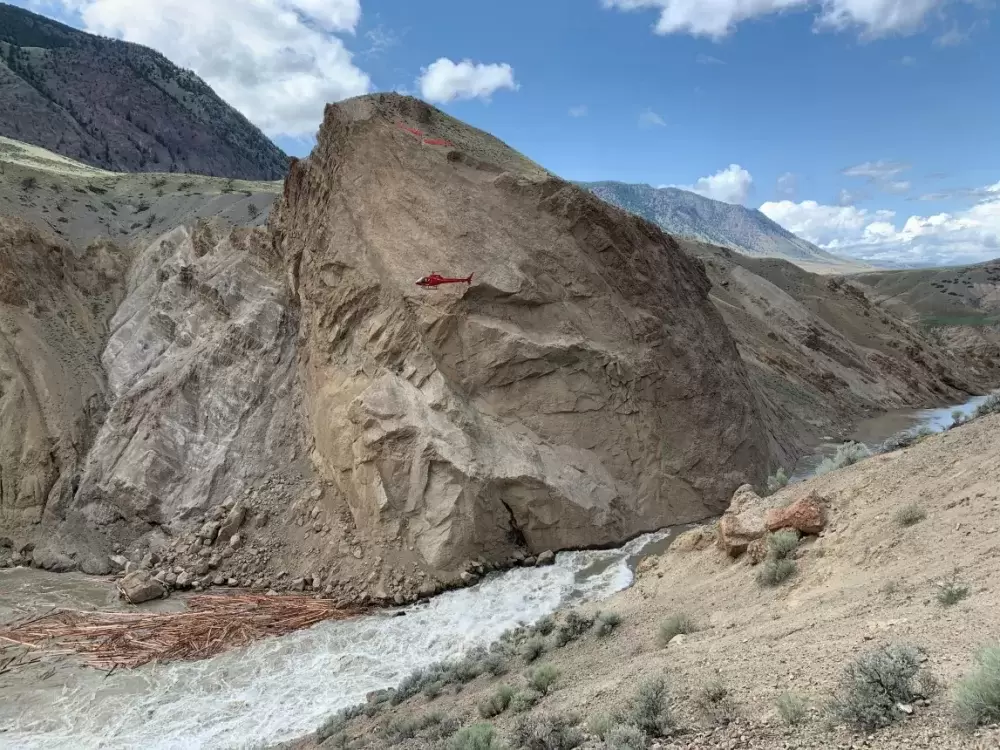A near tragedy for those that rely on salmon migrating up the Fraser River is turning around after a massive landslide occurred in a canyon north of Lillooet in late June.
The Big Bar slide was first reported to DFO June 23, raising concerns that migrating salmon would not be able to get past the five-metre waterfall created by the slide.
Chief Jimmy Lulua of Xeni Gwet’in said his nation has been receiving letters from DFO for the past two or three years stating that the Xeni Gwet’in people may have to cut down on their fishing due to declining stocks.
“I feel like this (declining salmon stocks) is DFO mismanagement,” said Chief Lulua.
He went on to say that half of all Fraser River stock comes from his territory.
“This is their nursery – they come here, the salmon are born here, are nursed and then they go back down,” he said, adding that his people have taken care of the precious resource for centuries, and this is the first time that his people have ever had to buy salmon from another First Nation.
Besides affecting this year’s access to an important food source for the Tsilhqot’in people, the rock slide could have a devastating impact on future Fraser River salmon stocks. If this year’s run of Fraser River salmon can’t get up river to the spawning grounds there will be little to no new salmon returning to sea.
“The last thing we should have to worry about is fish,” said Chief Lulua.
He likened fisheries mismanagement to that of a retail store.
“If you mismanage your stock then you have no inventory and if you have no inventory, you have no store,” he said.
His people, he said, want to go back to the old ways of stewardship in their territory. As of June 6, 2014, the Tsilhqot’in Nation has court-proven title to their territory. As title holder, the Tsilhqot’in Nation is able to determine use of and control access to the declared title lands. According to Chief Lulua, they don’t agree with having someone else managing their resource.
“We want to do the work ourselves the old way; we want a seat at the international table,” he said.
In an effort to meet the immediate need for salmon, Tsilhqot’in Nation turned to their negotiator, Ahousaht Ha’wilth Shawn Atleo, who reached out to his fellow Ha’wiih in Ahousaht for help.
Ahousaht Fisheries employee Larry Swan said he was delivering food fish to Ahousaht members living on the mainland in late August when he ran into Atleo at the ferry terminal.
“He told me about the big rock in the river,” said Swan, adding that he heard that the Tsilhqot’in people could not get fish from their river this year, as they had in the past.
According to Swan, Tsilhqot’in chiefs negotiated a deal with Ahousaht Ha’wiih for 1,800 pieces of salmon in exchange for cash. Two Ahousaht fishermen went out fishing and delivered their catch in Port Alberni, where they were met by a Tsilhqot’in flat deck truck. The fish were then transported back to Tsilhqot’in territory for distribution.
“There’s definitely a difference,” said Chief Lulua of the ocean-caught salmon.
By the time the salmon have gone back up the Fraser River to the spawning grounds they have lost most of their fat.
“These salmon were rich, more oily than we are used to, so drying them was a little different,” he added.
Salmon is not only a vital and healthy food source for the people, but also an important part of keeping the tradition of smoking and drying fish alive.
“Being able to have and eat fresh fish is part of our identity,” he said.
Chief Lulua said the salmon they received from Ahousaht means a lot to his people.
“It keeps the connection – to back in the day when we traded with other peoples,” he said, adding that the Tsilhqot’in people would travel over the coastal mountain range in the winter to trade with coastal nations, returning home in the spring.
According to Swan, funds received from the Tsilhqot’in chiefs were paid directly to the fishermen whom, he said, were grateful because T’aaq-wiihak fishing was not good in 2019.
“This shows that we can work together – no protocol, no government involvement,” said Swan.







